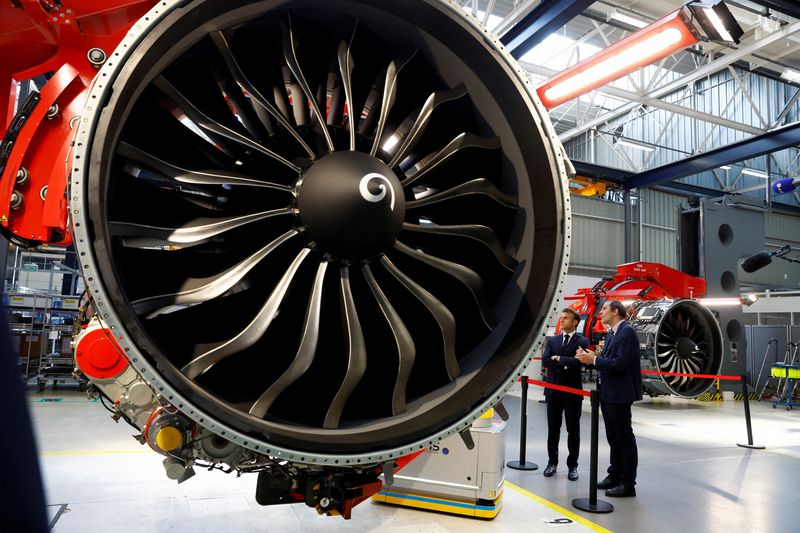By Tim Hepher, Valerie Insinna, Joanna Plucinska and Allison Lampert
PARIS (Reuters) - Global aerospace and defence companies will tout the cleaner transport and robotic weapons of the future as they also tackle urgent supply bottlenecks at next week's Paris Airshow, taking place under the shadow of climate fears and a war economy.
The world's largest aviation trade show, which alternates with Farnborough in the UK, returns to Le Bourget for the first time in four years after the pandemic forced the 2021 edition to be cancelled.
Aerospace companies go into the biennial event with growing demand expectations as airlines rush for capacity to meet demand and help reach industry goals of net zero emissions by 2050.
India's IndiGo is set to place a record order for 500 Airbus narrowbodies, first reported by Reuters, hard on the heels of a 470-plane Airbus and Boeing (NYSE:BA) order from Air India, which may also be formalised in Paris.
"There were about 3,300 aircraft that simply were not produced during the COVID years ... and that's about 15% of the global fleet," said Andy Cronin, CEO of leasing firm Avolon.
Some forecasts predict as many as 2,000 orders but some buyers such as Turkish Airlines have ruled out an immediate decision. Others remain cautious.
"If it does happen we're getting into bubble territory," said Agency Partners analyst Sash Tusa.
The event comes days after airlines meeting in Istanbul voiced interest in buying jets up to a decade ahead to avoid being left behind as traffic recovers from the pandemic. Gulf heavyweight Emirates said it is in talks to buy large jets.
"It's a seller's market like we've rarely seen," a senior industry source said, adding jet prices are up.
But there are even more pressing questions over the industry's ability to deliver on orders after the pandemic left the industry's supply chain in tatters.
And longer-term questions loom over the industry's ability to square relentless growth with its environmental objectives.
A GE Aerospace survey on Thursday found the industry split over whether it will meet objectives to reach net zero emissions by 2050, largely through Sustainable Aviation Fuel (SAF).
INCENTIVES
Willie Walsh, director general for the International Air Transport Association, said airlines were absolutely determined to reach the target but acknowledged it would be "very tough".
Environmentalists say the targets are unrealistic due to the low level of SAF available and argue the only way to reach them is to substantially reduce flying globally.
France will invest 200 million euros ($218.78 million) to boost SAF supplies, President Emmanuel Macron said on Friday.
While commercial aviation usually grabs show headlines, the Ukraine conflict has put pressure on Europe's fragmented arms industry to be more nimble and hold more stocks.
Defence budgets have ballooned as the West rushes arms to Ukraine and beefs up funding for future development programmes.
But some experts question whether funding can stay at levels high enough to restock munitions while simultaneously developing a new generation of fighters, drones and precision weapons.
"Even with all the funding in the U.S. budget, it's just not possible to do everything," said Justin Bronk, an air power expert with the Royal United Services Institute.
"European nations are all operating on a much smaller scale, fewer fleets, and therefore where you're having to make hard choices and trade-offs, those are significantly more binary."
Organisers say the show will also be the largest competitive stage for air taxi projects seeking to revolutionise urban transport with small battery-powered eVTOL aircraft.
Advances in materials, processing power and electric propulsion have inspired business ideas in civil and defence.

But analysts warn only a fraction of the 200 or so startups may survive, sparking a race to build up solid credentials.
"This is reality; this is not a comic book or a PowerPoint presentation," Volocopter Chief Executive Dirk Hoke said.